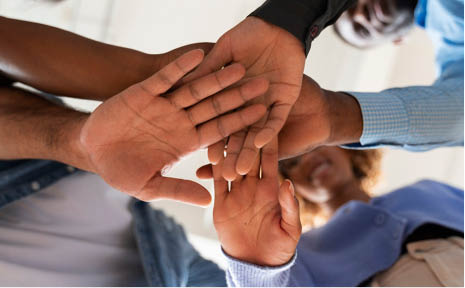Those things that ordinarily used to be popular cultural traditions among Africans forty years ago have almost become taboos in modern African societies including Nigeria. Unless we rise to tackle this aberration, even religious obligations would soon begin to suffer the potential threats posed by modernity and its irresistible tools. In the old African tradition for example, respect for elders was a dominant factor. In that orthodox society, a child or a young person was bound to greet and help to carry the load of anyone older than him. It did not matter whether or not the young person knew the older person.
Greeting, which is a universal moral principle and a strong tool for enhancing social cohesion has become selective among Nigerians in recent times. People choose who, when and where to greet even though, like courtesy, it costs nothing to greet or respond to it. While some for reasons best known to them do not greet, others fail to respond when greeted. Things just seem to have radically changed. The young now expects the older to greet him first. Some even see the exchange of greetings when two people meet as unnecessary.
Courtesy, too, is another important act of goodness that is missing in the character of many Nigerians today. People talk to and treat themselves as if they were First World War enemies. In Islam, “even a smile on the face”, according to prophetic traditions, “is charity”. Most of those guilty of this unfriendly manner are those who apparently went to school. Yet they behave crudely as if they never went to any school. Interpersonal relationships are no longer mutual. Most people think or consider money or material gains as the ultimate in all forms of relationships or associations. Many Nigerians, too, have become so unfriendly, uncivil and unethical in their association with others.
People react angrily to guileless situations that require simple yet mature response. They are ready to fight over the most trivial issue. They can embarrass others using vulgar expressions. When a person who refuses to join the queue at the petrol station, bank, hospital or market is asked to do so, he/she reacts by abusing those on the queue. When a driver/rider who drives/rides dangerously is advised by other road users to drive/ride with care, he/she reacts by insulting them. Values have so much eroded that an elder no longer has the confidence to correct the unruly behaviours of the young ones as the later would react rudely to the wise counsel of the former.
Nigeria as a traditional African society, remained famous overtime with a distinct model of deep-rooted fraternity and solid human relations. However, the behavioral pattern of an average Nigerian today contradicts those ethical values which over centuries made us unique from others. A typical contemporary Nigerian, for instance, is very unwillingly to help his fellow country men and women in situations of distress. Rather than offer necessary assistance to victims of misfortunes and natural disasters; many would be seen stealing, for instance, from the property of dead or injured accident victims at such periods of serious quandary. At best, people remain spectators where there is nothing for them to steal.
It is apparent from prevailing social aberrations bedeviling our country that there is a total breakdown of ethical values in modern Nigeria. The young and elderly Nigerian, the rich and the poor, the educated and the illiterate, the leader and the led, all seem to be alienated by greed, selfishness and corrupt mindset from the traditional African sense of brotherhood which hitherto bond Nigerians together as one people. Today, no individual is prepared to make sacrifices or go out of his way by inconveniencing himself for the sake of others. Materialism has taken over the reasoning faculty of many Nigerians. No one listens or gives attention to any issue that is without monetary benefits, which of course, has not only affected our general attitude to work but also our view of the essence of life itself.
As citizens, we have specific civic responsibilities placed upon us either by the constitutional provisions that govern our public and private life or by our respective societies which though may be seen to be part of the un-written constitution. Adherence to or negligence of these civic duties makes individuals good or irresponsible citizens. Some of the responsibilities of a citizen include obedience to laws of the land including highway codes; prompt payment of taxes, etc. However, it must not be supposed that the responsibilities of citizens end with these. We must realize that our actions are dependent on the actions of others with whom we interact, which by extension defines certain moral, social and community obligations on citizens.
For us to become worthy citizens of our country, there is need to improve upon and strengthen the decaying human relationship among us. This, in the art of living, is an important element of good citizenship. This actually calls for the consideration for the feeling of others. Many Nigerians are so self-centered that they think other people do not have as much right to happiness and the good things of this life as they do. Little gifts or alms can also reinforce relationships and unite us in our diversities. Let us learn to be respectful not only to constituted authorities but also to those superior to us in age, in knowledge, experience and indeed all human achievements.
As human beings, we truly have to depend on each other at every turn of our lives. No one, today, is exclusively self-sufficient in life. Therefore, it is important that we co-operate with others to ensure peaceful co-existence. We call on the National Orientation Agency (NOA) to chart a functional programme of cultural and ethical re-orientation that would impact on the general attitude of Nigerians; making the shared atmosphere in the country friendlier. The teaching of religious studies in schools should be strengthened. The moral decadence in the Nigerian society requires religious leaders and scholars to emphasize decency and ethical values in their preaching and sermons to Nigerians, especially the youths.
We look forward to a Nigeria where citizens will not shunt queues; a country where people will not take, receive or appropriate anything to themselves except that which lawfully belongs to them. May Allah guide us to make Nigeria the home of virtues and virtuous people, amin.

 Join Daily Trust WhatsApp Community For Quick Access To News and Happenings Around You.
Join Daily Trust WhatsApp Community For Quick Access To News and Happenings Around You.


